
Understanding Hair Regrowth Treatments: Myths and Misconceptions Debunked
Overnight treatments claiming to promote natural hair regrowth often fall short in addressing underlying hair loss issues, emphasizing the importance of seeking expert guidance.The market is saturated with various hair regrowth products and treatments, yet not all deliver reliable results as promised. To grasp the reality behind hair regrowth treatments, it’s essential to gain some understanding of the factors contributing to hair loss.
Understanding the Basics of Hair Loss
Hair loss, also referred to as alopecia, is a condition characterized by an excessive loss of hair beyond the usual levels. The onset of hair loss can be either abrupt or gradual, depending on the severity of the condition. Those affected may experience partial or complete hair loss.

Some typical types of hair loss include:
Androgenetic Alopecia: This prevalent condition is primarily triggered by genetic factors.
Alopecia Areata: It affects individuals across all age groups and is often linked to an autoimmune disorder.
Telogen Effluvium: This involves the sudden shedding of hair, typically triggered by illness, medication, physical or emotional stress, and hormonal changes.
Traction Alopecia: It occurs when the hair is consistently subjected to prolonged and excessive tension, ultimately leading to damage to the hair follicles over time.
Prevalence Of Myths & Misconceptions About Hair Loss Treatments

Addressing the fundamental cause of hair loss constitutes the initial step in managing and potentially reversing the condition, underscoring the importance of seeking professional guidance.But, the prevalence of myths and misconceptions surrounding regarding several hair regrowth treatments further complicates the search for a genuine solution to hair loss.
5 Hair Regrowth Myths and Misconceptions
1. Hair loss treatments are only effective for men
Reality: Both men and women, suffer from hair thinning and loss, but in different patterns. Hair regrowth procedures are available for both men and women, with certain treatments proving effective for both genders.
2. Hair regrowth treatment have harmful side effects
Reality: Not all treatments pose the same degree of risks or side effects. Seeking guidance from a hair loss expert is advisable to gain insight into the possible risks and side effects of restoration treatments.
5 Hair Regrowth Myths and Misconceptions
3. Hair regrowth treatments provide instant results
Reality: Hair growth treatments provide gradual results. Consistency and adherence to treatments are typically necessary for significant results in the long run. The trajectory of the hair regrowth journey is also contingent upon the specific hair loss condition and the overall health of the individual.
5 Hair Regrowth Myths and Misconceptions
4. Natural remedies are always effective and safe
Reality: Although natural remedies usually have low risk of side effects, not all of them are backed by scientific evidence. It is advisable to consult a hair expert before utilizing any natural remedies, as they might potentially interact with other medications and result in side effects.
5 Hair Regrowth Myths and Misconceptions
5. Hair loss is inevitable with age
Reality: Through appropriate treatments and preventive measures, it is feasible to decelerate or even reverse the effects of hair loss associated with aging.
A New Dawn for Hair Loss Treatments!
Here are some of the most effective and widely recognized hair loss treatments that have been scientifically proven to be effective in either slowing down hair loss, promoting hair regrowth, or both.
Hair Restoration Treatments
Minoxidil (Rogaine):
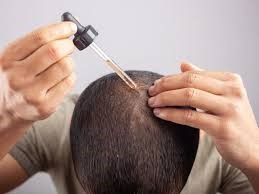
Minoxidil is a topical solution or foam applied directly to the scalp. It's believed to work by increasing blood flow to the hair follicles, promoting hair growth, and preventing further hair loss. Minoxidil is approved by the FDA for both men and women and is available by prescription and over-the-counter.
Finasteride (Propecia):

Finasteride is an FDA-approved oral medication that works by inhibiting the conversion of testosterone into dihydrotestosterone (DHT), a hormone that can shrink hair follicles and lead to hair loss in genetically susceptible individuals. Finasteride is recommended for male pattern baldness and has been shown to be effective in slowing down hair loss and promoting hair regrowth in men.
Laser Cap (Low-Level Laser Therapy):

Platelet-Rich Plasma (PRP) Therapy:
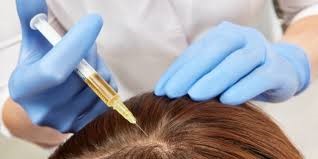
Studies have shown promising results with PRP for hair loss.PRP therapy involves injecting a concentrated form of the patient's own blood plasma, rich in platelets, into the scalp. Platelets contain growth factors that may stimulate hair follicles, promote hair regrowth, and improve hair thickness.
Injectable Platelet Rich Fibrin (IPRF)
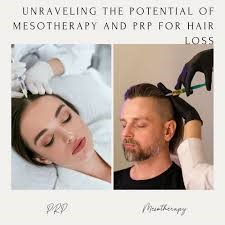
IPRF treatment for hair loss is a relatively new approach that involves using the patient's own blood to stimulate hair growth. There are a number of scientifically based articles showing its efficacy increasing hair count, hair thickness, and the growth phase of the hair cycle. It contains more platelets per microlitre in addition to leukocytes and mesenchymal stem cell that potentially stimulate hair follicles and promote hair growth.
Growth Factor Concentrate (GFC)
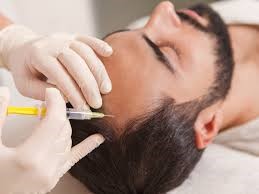
GFC is the next generation treatment for hair loss that involves the application of concentrated growth factors derived from platelets from the patient’s blood or other sources to stimulate hair follicle activity and promote hair growth.
GFC stimulates cellular proliferation, angiogenesis (the formation of new blood vessels), and tissue repair, which are essential processes for hair follicle regeneration and hair growth.
Mesotherapy
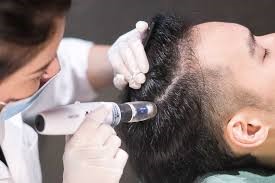
Mesotherapy for hair is a treatment that involves injecting a combination of vitamins, minerals, amino acids, and other nutrients directly into the scalp to promote hair growth and improve the overall health of the hair follicles. Mesotherapy provides visible improvements in density, texture, and overall appearance of the hair. It is a safe, effective, and minimally invasive option for individuals looking to address hair loss and improve the health and vitality of their hair.
Hair restoration Surgery:
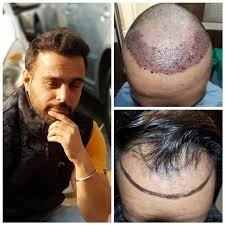
Hair restoration surgery is a well-established and scientifically proven procedure for treating hair loss. It involves harvesting hair follicles from areas of the scalp with healthy hair growth (the donor area) and restorationing them into areas with thinning or balding hair (the recipient area). A hair restoration is highly effective in restoring hair density and can provide lasting results when performed by a skilled surgeon. Hair restoration techniques have evolved significantly over the years, offering more precise and natural-looking results with shorter recovery times.
If you want to get real answers and real solutions to your hair loss solutions, it’s important to seek expert advice from a trusted clinic like DNCC.
Our experienced hair loss experts will help determine the cause of your hair loss and guide you with a treatment plan that works to restore your hair. Book a consultation today.